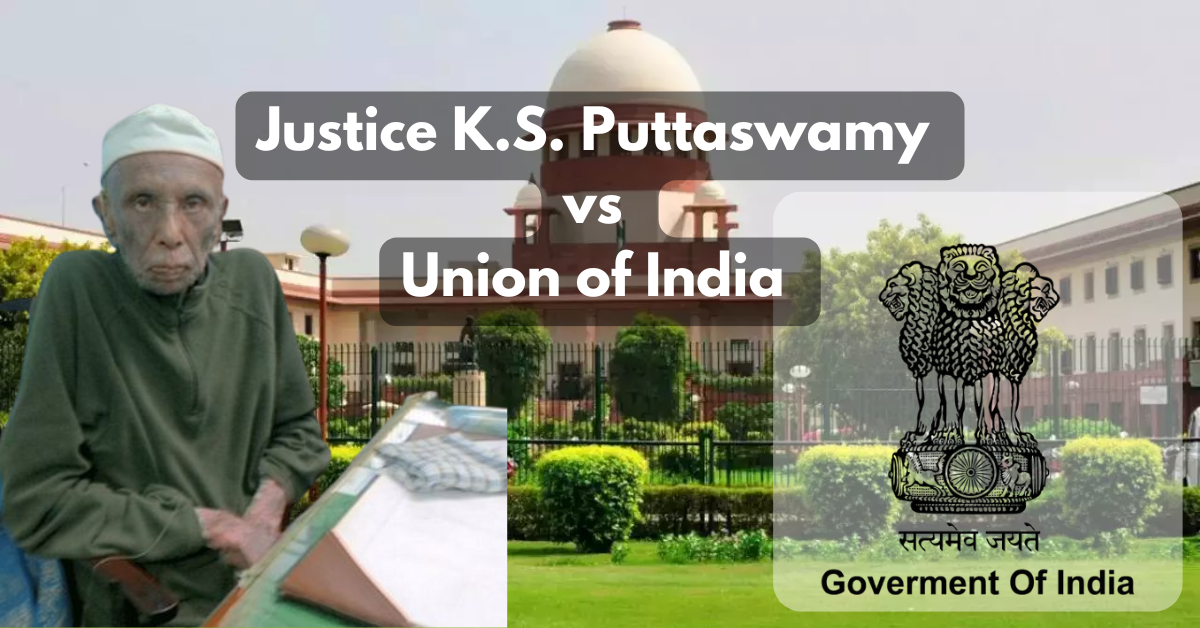
Landmark Judgement on Right to Privacy: Justice K.S. Puttaswamy vs Union of India
The Supreme Court of India, in the landmark case of Justice K.S. Puttaswamy (Retd.) vs Union of India, delivered a historic judgment on August 24, 2017, that enshrined the right to privacy as a fundamental right under the Indian Constitution. This decision, rendered by a nine-judge bench, unanimously affirmed that privacy is intrinsic to the right to life and personal liberty guaranteed under Article 21 of the Constitution. In this legal article, we will learn about the profound implications of this judgment, particularly in the context of the Aadhaar project, and explore its impact on future legal battles concerning privacy in the digital age.
Background and Context
The journey to recognizing the right to privacy as a fundamental right began with a petition filed by Justice K.S. Puttaswamy (Retd.), challenging the constitutional validity of the Aadhaar scheme. Introduced by the Government of India, Aadhaar aimed to provide a unique identification number to every resident linked to their biometric and demographic data. While the government argued that Aadhaar was crucial for efficient delivery of welfare services and preventing leakages in subsidies, critics raised concerns about potential violations of privacy, given the vast amount of personal data being collected.
The pivotal question before the Court was whether the right to privacy could be considered a fundamental right under the Indian Constitution, particularly when earlier decisions, such as M.P. Sharma v. Satish Chandra (1954) and Kharak Singh v. State of Uttar Pradesh (1962), had held that privacy was not a fundamental right.
The Judgment
In a monumental decision, the Supreme Court overruled its earlier judgments and unequivocally held that the right to privacy is a fundamental right protected under Article 21 of the Constitution. The Court’s reasoning was rooted in the understanding that privacy is essential to the preservation of personal liberty and dignity, both of which are foundational to India’s constitutional framework.
The judgment was articulated in several key findings:
1. Privacy as an Integral Part of Article 21: The Court emphasized that the right to privacy is inherent in the right to life and personal liberty under Article 21. Privacy, the Court held, is not an isolated right but a comprehensive right that includes aspects of bodily autonomy, informational privacy, and the sanctity of personal space.
2. Overruling of Precedents: The bench overruled the earlier judgments in M.P. Sharma and Kharak Singh, recognizing that the understanding of privacy had evolved and that these cases did not reflect the current constitutional interpretation of fundamental rights.
3. Relationship with Other Fundamental Rights: The Court also linked the right to privacy with other fundamental rights, such as the freedom of speech and expression (Article 19) and the right to equality (Article 14), arguing that privacy is essential for the meaningful exercise of these rights.
4. Limited Restrictions on Privacy: While affirming privacy as a fundamental right, the Court acknowledged that it is not an absolute right. Any infringement of privacy must meet the test of legality, necessity, and proportionality, ensuring that any state action infringing on privacy is lawful, necessary for a legitimate aim, and proportionate to the need being addressed.
The Impact of the Judgment
The declaration of privacy as a fundamental right has far-reaching implications for Indian jurisprudence, particularly in the digital age. The judgment has set the stage for several critical legal battles and has influenced the development of data protection laws and policies in India.
1. Data Protection and Aadhaar: The judgment directly impacted the Aadhaar scheme. In a subsequent decision in 2018, the Supreme Court upheld the constitutional validity of Aadhaar but imposed significant restrictions on its use. Aadhaar could not be made mandatory for services that did not involve the expenditure of public funds, such as bank accounts, mobile phone connections, or school admissions. This marked a significant shift in how personal data could be handled by the state and private entities.
2. Development of the Personal Data Protection Bill: The recognition of the right to privacy as fundamental laid the groundwork for the formulation of India’s data protection regime. The Personal Data Protection Bill 2019, which is still under consideration, seeks to establish a framework for data protection in line with the principles outlined in the Puttaswamy judgment. It aims to safeguard individuals’ data while balancing the state’s interests in national security and public order.
3. Impact on Surveillance and State Powers: The judgment has also prompted a re-evaluation of state surveillance practices. The principles of legality, necessity, and proportionality articulated by the Court have become critical benchmarks in assessing the constitutionality of surveillance laws and practices. This has implications for laws such as the Information Technology (Intermediary Guidelines and Digital Media Ethics Code) Rules, 2021, which have been challenged for infringing on privacy rights.
4. Personal Freedom and Autonomy: The Puttaswamy judgment has been instrumental in reinforcing the constitutional commitment to personal freedom and autonomy. It has influenced subsequent judgments on issues such as the decriminalization of homosexuality (Navtej Singh Johar v. Union of India, 2018), where the Court invoked privacy as a ground for protecting the rights of the LGBTQ+ community.
5. Balancing Technological Advancements with Rights: In an era of rapid technological advancements, including artificial intelligence, big data, and surveillance technologies, the Puttaswamy judgment serves as a guiding principle for balancing innovation with the protection of fundamental rights. It mandates that any technological intervention by the state or private entities must respect the privacy and dignity of individuals.
Conclusion
The Justice K.S. Puttaswamy v. Union of India judgment is a watershed moment in Indian constitutional law. By affirming the right to privacy as a fundamental right, the Supreme Court not only expanded the scope of individual liberties but also laid the foundation for a robust legal framework to protect personal data and privacy in the digital age.
This judgment has had and will continue to have, profound implications for how we understand and protect privacy in India. It serves as a reminder that in the face of technological advancements and state power, the judiciary remains a vigilant guardian of individual rights. As India continues to evolve in the digital era, the principles established in the Puttaswamy case will be crucial in ensuring that the balance between individual freedoms and state interests is maintained, with privacy at the heart of that balance.
To Know More About Such Landmark Judgements, Visit Innerwork Advisors LLP, Best Legal Service Providers in Kolkata






